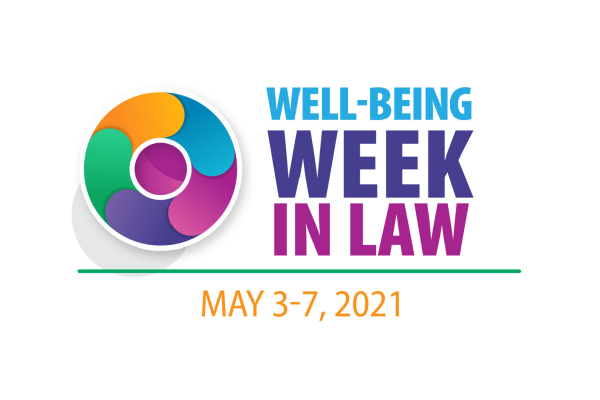In the chaos of parenting during a pandemic, mindfulness strategies can be so helpful but also feel out of reach — and a recent program offered tips to help.
Practical strategies to approach incorporating mindfulness as a parent in the legal profession were shared in a recent program hosted in collaboration with the Massachusetts SJC Lawyer Well-Being Committee and Mindfulness in Law Society New England Chapter.
Program Recording
Certified mindfulness teacher and former lawyer, Brenda Fingold shared practical mindfulness strategies, and we heard from parents in the profession about what has helped them most — Amy Pruett (Williams Mullens), Bernardo Cuadra (Mass AGO), Tracey Meyers, Psy.D. (LCL MA staff clinician & certified mindfulness teacher) A full recording of the presentations is now available through the Lawyer Well-Being Committee website.
Click to access the recording (Passcode: N2Z!ry2w) A few highlights follow.
Easy Mindfulness Strategies for Busy Parents
When trying to practice mindfulness as a parent, it helps to remember that it won’t look or feel pretty or perfect — and that’s the whole point. Brenda began the program with a great overview of how our brains are wired to resist our mindfulness efforts, and how to embrace that with radical acceptance. “You can practice mindfulness next to a fire station,” as Tracey pointed out. It’s important not to overwhelm ourselves and only to attempt 2 or maybe 3 of the suggestions below:
- Short Moments/Many Times. Staple practice to something you are already doing in a way that doesn’t require extra time, e.g. brushing your teeth, climbing stairs, first and/or last bites of your meals or shower.
- One Minute Mindful Pause. Choose an anchor, and when you notice the mind has wandered, bring it back.
- One Minute Mindful Stretch. Intersperse them regularly throughout the day.
- Connect to breath and body before getting out of bed in the morning.
- I spy (aka – the working parent meditation). Look around you and name what you see and what is happening inside: “I see a bird, I feel hot and am going to lower the heat, I see the new pillow I bought and feel happy, my child is crying.” This helps us stay awake and aware of what’s happening vs. sleepwalking or autopiloting through the day.
- Name it to Tame it. Phrasing feelings as “sadness is here,” rather than “I feel sad” helps us not over-identify with our current feelings, allowing them to come and go more freely.
- Practice Self-Compassion. A practical 3-part process is offered in the following section.
- Practice Mindfulness with Kids. Find suggestions below!
- Pleasant – Unpleasant – Neutral/Boring. Start noticing and naming the ever changing nature of human life; Brenda offers a helpful mantra for accepting unpleasant observations rather than fighting reality, “Ah, so I guess this is just how it is now.”
- Active Listening. Tracey shared her personal experience with how helpful active listening is, especially when tension levels are high for any reason. Find tips here.
Self-Compassion Process
Noting how seriously we take our work as parents and as lawyers, Brenda shared a 3-part process to practice self-compassion from Kristin Neff, author of Mindful Self-Compassion:
- Acknowledge that this is suffering. “I want it to be different.”
- Remember common humanity – “So many working working parents are feeling this way! I feel for all of us.”
- Ask: “How can I care for myself in this moment?”
Tips for Practicing with Kids
Finally, Brenda’s tips for practicing mindfulness with our kids can also be great tools for as as adults alone. And as mentioned in the program, some of our kids tend to resist our suggestions, and it can help to get creative. We can try asking them to help us remember to take the occasional mindful breath or stretch, e.g. whenever they don’t like our mood. (“I’m sorry I lost my patience; will you help me remember to take a deep breath next time?”) And sometimes, modeling the practice without encouraging them to join you can have a more convincing effect on their developing minds — modeling consistently typically works best.
- Bring mindfulness to one interaction with your child/children each day.
- Balloon Breathing (mimic a balloon inflating/deflating with your arms) and/or Five Finger Breathing (tracing up and down the outline of each finger with each breath).
- Read about mindfulness with them.
- Do a guided body scan together.
- Teach them how we humans FLIP OUR LIDS and make a list of options for when our lids get flipped. (Hear more about this at the 21-minute mark in the recording.)
SuperMom: Support for Lawyers (Monthly Meetings)
Each month on the 4th Wednesday at 12pm, LCL MA and the WBA Parents’ Forum host a Free & Confidential monthly support and discussion group for lawyer moms and law student moms, led by Tracey Meyers, Psy.D. In these monthly meetings, peers regularly brainstorm strategies for one others’ struggles and come together to connect, acknowledge and appreciate the many persistent problems we face as mothers in the legal profession. While it’s harder than ever to make time for the support we need, it’s more needed than ever as well.
Additional Resources
Materials from Brenda Fingold (Brendafingold.com)
Clearing Your Mind (InsightTimer, a guided meditation from attorney and mindfulness teacher, Claire E. Parsons)
Free & Confidential Consultations:
Lawyers, law students, and judges in Massachusetts can discuss concerns with a licensed therapist, law practice advisor, or both. Find more on scheduling here.
. . .
An earlier post “Feb. 23: Parenting in Unprecedented Times as a Lawyer” now redirects here.




